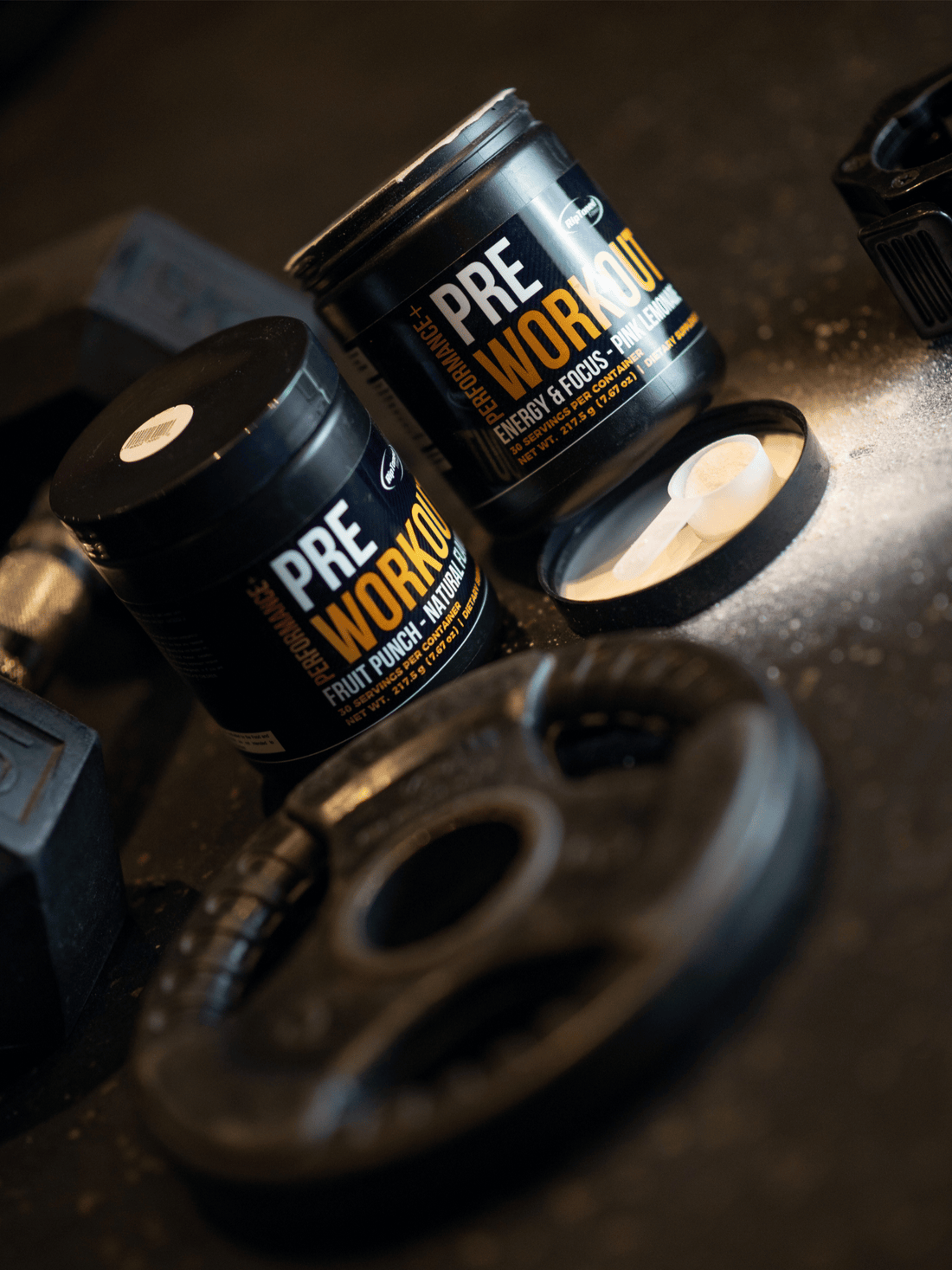Curious about how long a pre-workout takes to kick in? Most pre-workouts start to take effect within 30 to 45 minutes.
This can depend on various factors like your metabolism, what you’ve eaten, and the type of pre-workout you use. Let’s dive deeper into what influences this timing and how you can optimize your pre-workout routine for the best results.
What is Pre-Workout?

Pre-workout supplements enhance workout performance by boosting energy, endurance, and strength. These supplements usually come in powder form, which is popular due to its ease of mixing and consumption. However, you can also find ready-to-drink options, capsules, and gummies catering to different preferences.
The primary active ingredient in most pre-workout supplements is caffeine, known for its ability to enhance energy levels and mental alertness. Other common ppre-workoutingredients include beta-alanine, branched-chain amino acids (BCAAs), electrolytes, and nootropics, which can significantly boost concentration and mental task performance during exercise.
Choose a pre-workout to kick that matches your body type and fitness goals for optimal results.
Caffeine
Caffeine is a popular ingredient in pre-workout supplements. It is primarily valued for its ability to boost energy levels, mental alertness, and exercise performance. It works by stimulating the central nervous system, which can delay muscle fatigue and improve overall workout performance.
Knowing how your body metabolizes caffeine can optimize its benefits, as absorption and tolerance vary among individuals.
Beta-Alanine
Beta-alanine is another key ingredient in many pre-workout supplements, known for its role in delaying fatigue and improving high-intensity exercise performance. This amino acid is particularly beneficial for activities such as strength training and cardio.
One common side effect of beta-alanine is a harmless tingling sensation called paresthesia, which indicates that the supplement is active in your body.
Branched Chain Amino Acids (BCAAs)
Branched-chain amino acids (BCAAs) are essential amino acids, including leucine, isoleucine, and valine, that play a crucial role in supporting endurance and providing energy during exercise. BCAAs help reduce muscle breakdown and support muscle growth, making them a valuable addition to pre-workout supplements for enhancing exercise performance and endurance.
How Long Does Pre-Workout Take to Kick In?

The time it takes for pre-workout supplements to kick in generally falls between 30 minutes to 1 hour. For optimal results, it’s recommended to take your pre-workout about 30-45 minutes before your workout session. Many users report feeling a significant energy boost within 15-30 minutes after consumption, indicating that the supplement is starting to take effect.
However, the exact timing can vary depending on several factors, including the types of pre-workouts, individual metabolism, and meal timing. For instance, ready-to-drink supplements, due to their liquid consistency, typically offer faster onset times compared to powder forms. Knowing these factors helps you plan your intake to maximize performance.
Caffeine Absorption
Caffeine absorption is a critical factor influencing the timing of pre-workout effects. The body reaches peak plasma levels of caffeine approximately 30 to 120 minutes after consumption. Various factors, including drugs and substrates that inhibit or induce CYP1A2, can alter how the body metabolizes caffeine.
Pre-workout supplements often contain more caffeine than coffee, so understanding caffeine absorption is key to optimizing performance.
Individual Metabolism
Individual metabolism plays a significant role in determining how quickly pre-workout supplements take effect. Factors such as metabolism, caffeine tolerance, body size, and genetic makeup can significantly influence the kick-in time.
Knowing how your body responds to these supplements helps predict their timing and effectiveness, optimizing your workout routine.
Meal Timing
Meal timing is another crucial factor affecting the absorption rates of pre-workout supplements. Taking pre-workout on an empty stomach typically leads to faster absorption and stronger effects due to quicker digestion. Conversely, consuming pre-workout with food may result in slower absorption, as food can hinder digestion and nutrient release into the bloodstream.
For those who experience discomfort from taking pre-workout on an empty stomach, having a light snack or moderate meal 90 to 120 minutes prior may be advisable.
Factors Influencing Pre-Workout Kick-In Time
Several factors can influence how long it takes for pre-workout supplements to kick in. These include the caffeine content, proprietary blends, and metabolism factors such as caffeine absorption, body size, race, ethnicity, age, and smoking. Additionally, factors like individual metabolism, caffeine sensitivity, and meal timing play critical roles in determining the effectiveness and timing of pre-workout supplements.
Using pre-workout supplements on a fasted or fed state can significantly alter their effectiveness. Proper hydration and meal timing can either enhance or delay the absorption rates of these supplements. Understanding these factors can help you tailor your pre-workout regimen to achieve optimal results and avoid gastrointestinal discomfort.
Caffeine Sensitivity and Tolerance
Caffeine sensitivity refers to how strongly individuals respond to caffeine, which can alter their experience of pre-workout supplements. Sensitive individuals often feel more intense effects from caffeine, leading to a greater perceived benefit.
Conversely, those with a high caffeine tolerance may experience diminished effects, impacting their overall experience.
Body Size and Composition
Body size and composition significantly affect the onset of pre-workout effects. Individuals with larger body sizes may experience a slower onset due to the increased volume and mass requiring more time for absorption. Those with higher muscle mass may experience quicker effects due to increased blood flow and metabolism in muscle tissue.
Tailor your pre-workout intake to your specific needs by understanding these variations.
Food-Drug Interactions
Food-drug interactions can significantly impact the absorption and effectiveness of pre-workout supplements. Certain medications can modify how the body processes caffeine, leading to diminished or unpredictable results.
Being aware of these interactions can help you manage your pre-workout regimen more effectively and avoid adverse effects.
Signs Your Pre-Workout Has Kicked In

Recognizing when your pre-workout has kicked in helps gauge its effectiveness and timing. Typically, users start to feel a boost in energy levels and greater focus within 15-30 minutes after consumption. These effects can vary depending on individual sensitivity and the specific pre-workout formula used.
Common indicators that your pre-workout is working include increased energy levels, enhanced mental focus, elevated heart rate, and a tingling sensation. These signs can help you determine when to start your workout to maximize performance and achieve your fitness goals.
Increased Energy Levels
One of the primary indicators that your pre-workout has started to take effect is a noticeable uplift in energy levels. This boost can empower you to exert more effort during your workouts and potentially increase your stamina.
Pre-workout supplements are designed to elevate energy levels, enabling users to perform at their best during high-intensity workouts with a pre-workout supplement.
Enhanced Focus
Another sign that your pre-workout has kicked in is enhanced focus. Users often report improved mental clarity and concentration shortly after taking pre-workout supplements. This heightened focus can help you stay on task and perform better during your workouts, allowing you to push through challenging exercises and achieve maximum benefits.
Tingling Sensation
The tingling sensation, often felt when pre-workout kicks in, is due to beta-alanine interacting with nerve receptors in the body. This harmless sensation, known as paresthesia, indicates that the supplement is active and ready to help you power through your workout.
While it might feel strange at first, it’s a common and temporary effect that many users experience.
How Long Do Pre-Workout Effects Last?
The duration of pre-workout effects can vary widely, typically lasting between 1.5 to 6 hours, depending on the ingredients and individual responses. Caffeine, a primary ingredient in many pre-workout supplements, has a half-life of approximately 3 to 7 hours, which can sustain energy and alertness during workouts. However, the noticeable effects of pre-workout generally persist for about 60 to 90 minutes before gradually tapering off.
Factors such as the specific pre-workout formula, individual metabolism, and the presence of other ingredients can also influence how long the effects last. For instance, stim-free pre-workouts may wear off faster compared to those with caffeine. Time your pre-workout intake to match your training session by understanding these variables.
Half-Life of Ingredients
The half-life of ingredients in pre-workout supplements significantly impacts their duration. Caffeine’s half-life of approximately 5 to 6 hours means its effects can last for several hours, providing sustained energy levels during workouts.
The half-life concept refers to the time it takes for a substance’s concentration in the body to reduce by half, which is crucial for understanding how long pre-workout effects will last.
Exercise Performance Benefits
Pre-workout supplements offer various exercise performance benefits, primarily due to their ingredients like caffeine, beta-alanine, and BCAAs. Caffeine helps boost energy levels, allowing users to perform more repetitions or lift heavier weights. Beta-alanine enhances endurance, enabling individuals to sustain high-intensity exercises for longer periods.
Additionally, BCAAs support muscle growth by reducing muscle breakdown during exercise.
Is It Safe to Take Pre Workout Every Day?
While pre-workout supplements can be beneficial, taking them every day is not always recommended. Daily consumption can lead to a reliance on stimulants like caffeine, potentially resulting in negative effects such as jitters, anxiety, and sleep disturbances. It’s important to consider the timing of your intake, as taking pre-workout supplements in the evening can interfere with sleep.
For those considering daily use, it’s advisable to consult a physician to ensure safety and avoid potential stimulant dependency. Knowing the risks and benefits of daily pre-workout use helps in making informed decisions and maintaining a healthy relationship with supplements.
Stimulant Dependency
Stimulant dependency can develop with regular consumption of pre-workout supplements containing caffeine. As your body adapts to daily caffeine intake, you may require progressively larger doses to achieve the same effect, leading to increased caffeine tolerance. High caffeine tolerance can result in side effects such as jitters, anxiety, and sleep disturbances.
Manage your pre-workout consumption and prevent dependency by starting with a half serving and adjusting as needed.
Consulting a Primary Care Physician
Before integrating pre-workout supplements into your daily routine, it’s important to discuss your plans with a healthcare provider or primary care physician. They can help you assess the safety and suitability of pre-workout supplements based on your health status and fitness goals.
Consult a physician to make informed decisions and avoid potential health risks.
Types of Pre-Workout Supplements
Pre-workout supplements come in various forms, each offering unique benefits and drawbacks. The most common types include powders, ready-to-drink options, capsules, and gummies. These multi-ingredient dietary supplements are designed to improve energy and performance in athletic activities. The choice of pre-workout formulas can depend on personal preferences, convenience, and desired absorption rates.
Powder forms are highly popular among fitness enthusiasts due to their rapid absorption and effectiveness. Ready-to-drink options provide quick and convenient energy boosts, making them ideal for on-the-go users. Capsules and gummies offer discrete and easy-to-carry alternatives, though they may have slower absorption rates compared to powders.
Powder Form
Powder-form pre-workouts are favored for their convenience and rapid absorption. To ensure proper dilution and absorption, mix the powder with 8-12 oz of water before consumption. These pre-workouts typically absorb quickly into the bloodstream, allowing for a faster onset of effects compared to other forms.
Fitness enthusiasts often prefer powders for their effectiveness in enhancing physical performance.
Ready-to-Drink Options
Ready-to-drink pre-workout beverages are designed for quick consumption, making them ideal for those who need a fast and convenient energy boost. These beverages usually have similar absorption rates to powders, providing effective and timely energy boosts for your workouts.
Their on-the-go nature makes them a popular choice for busy individuals.
Capsules and Gummies
Capsules and gummies offer discrete and palatable alternatives for those who dislike the taste of traditional powders. Gummies, in particular, provide a tasty option but may contain added sugars compared to other forms.
Both capsules and gummies are easy to carry and consume without the need for mixing, making them convenient for pre-workout supplementation.
Summary
In summary, pre-workout supplements can significantly enhance your workout performance by boosting energy, improving endurance, and increasing strength. Understanding the timing and factors that influence the kick-in time can help you optimize your workouts. While these supplements offer various benefits, it’s important to use them responsibly and consult a physician if considering daily use. By choosing the right pre-workout form and timing your intake effectively, you can achieve your fitness goals and elevate your exercise routine.
Frequently Asked Questions
How long does it take for pre-workout to kick in?
Pre-workout supplements typically take about 30 minutes to 1 hour to kick in, though many users experience an energy boost within 15-30 minutes. Timing your intake accordingly can enhance your workout experience.
What are the common signs that my pre-workout has kicked in?
You can expect to notice increased energy levels, enhanced focus, an elevated heart rate, and a tingling sensation when your pre-workout begins to take effect. These indicators suggest that it's working to boost your performance.
How long do the effects of pre-workout last?
The effects of pre-workout supplements typically last between 1.5 to 6 hours, varying based on the ingredients and individual factors. It's important to consider your own tolerance and the specific product used.
Is it safe to take a pre-workout every day?
It is generally not safe to take pre-workout supplements every day due to the risk of stimulant dependency and other adverse effects. Consulting a physician before making it a daily practice is highly advisable.
What are the different forms of pre-workout supplements?
Pre-workout supplements are available in several forms, such as powders, ready-to-drink beverages, capsules, and gummies, each providing distinct advantages. Choosing the right form depends on your convenience and preference.


